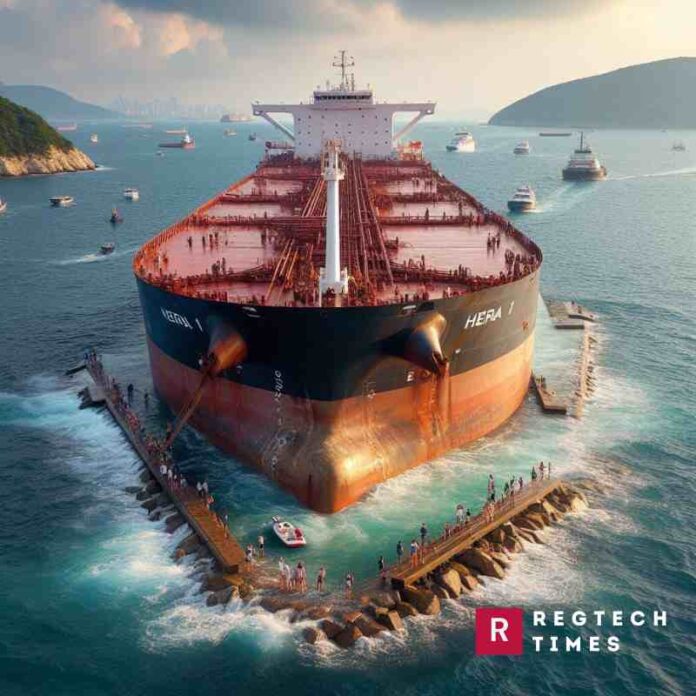In a recent incident highlighting the complexities of the Russian shadow fleet, the oil tanker Hera 1 became stranded off the coast of Turkey, obstructing the Dardanelles Strait. This blockage underscores the intricate and often opaque operations of Russia’s oil transportation amid global sanctions.
Technical Failure and Strategic Disruption
On the morning of May 23rd, Hera 1, a Russian oil tanker, encountered engine failure at the entrance to the Dardanelles Strait in northwestern Turkey. This malfunction halted southbound ship traffic in the strategically crucial strait for five hours. Despite the technical issues, authorities managed to restore traffic and anchor the tanker, mitigating prolonged disruptions.
Journey of Hera 1 and Cargo Details
Hera 1 was on a journey from the Black Sea port of Novorossiysk to India, carrying approximately 730,000 barrels of Russian crude oil. This route, passing through the Dardanelles and Suez Canal, is vital for Russian oil exports, especially in light of current geopolitical tensions and sanctions.
The Hera 1 tanker, part of the so-called “shadow fleet” used to transport Russian oil under sanctions, was en route to India. This highlights India’s position as a significant importer of Russian oil, especially after Western sanctions following the Ukraine invasion. India’s need for oil and its decision to purchase from Russia is influenced by various factors, including economic considerations and the need for affordable energy supplies.
The shipment of approximately 730,000 barrels of Russian crude oil to India from the Black Sea port of Novorossiysk demonstrates India’s active participation in the global oil trade amidst geopolitical tensions.
Unregistered Ownership and Insurance Concerns
One of the notable aspects of the Hera 1 incident is the lack of transparency regarding the tanker’s ownership and insurance. Bloomberg reported that neither the insurer nor the actual owner of Hera 1 is registered in the International Maritime Organization’s database. This opacity is a hallmark of the so-called “shadow fleet,” which comprises ships operating in defiance of international sanctions.
Sanctions are monstrous for the shipping and aviation industry. As the vessels start ageing their machines fail to work.
You can read about How sanctions impacted Iran’s Aviation Fleet
The Rise of the Shadow Fleet
The shadow fleet, estimated at around 600 vessels, or roughly 10% of the global number of large tankers, plays a crucial role in transporting Russian oil. These ships often lack mandatory insurance from certified international insurers, raising significant safety and regulatory concerns. Industry experts, struggle to identify the operators and owners of this clandestine armada. They are not provided with the maintenance services in the international ports. This is the primary reason why the stranding of Hera 1 could be a trade issue.
Teapot Refineries: Effective Chinese Tool in Sanction Evasion
US Sanctions against Sovcomflot results in a decrease in Russian Oil Exports
Purchasing Old and Scrap-Worthy Ships
In response to sanctions and a pivot away from Russian energy by Europe, new players have emerged in the tanker market. Shell companies based in Dubai or Hong Kong have purchased ships from European owners or utilized ageing vessels that would typically be scrapped. This trend has been particularly evident since Russia’s invasion of Ukraine, as Asia, particularly China and India, has increased its Russian oil imports.
Categorizing the Fleet: Gray and Dark Ships
“Gray ships” refer to tankers that were sold after the invasion of Ukraine, primarily by European owners who sought to distance themselves from Russian trade due to sanctions and geopolitical pressures. These vessels found new operators in the Middle East and Asia, regions that have been less stringent in enforcing sanctions against Russia.
The sale and transfer of these ships typically involve complex transactions often facilitated by shell companies. These companies, based in jurisdictions such as Dubai or Hong Kong, provide a layer of anonymity, making it challenging to trace the true ownership of the vessels. This anonymity is crucial for continuing operations without attracting regulatory scrutiny.
Once under new ownership, gray ships are repurposed to transport Russian oil, circumventing the direct involvement of European entities that are under sanctions. This shift not only helps Russia continue its oil exports but also introduces new, less regulated players into the maritime industry. These operators may lack the stringent safety and environmental standards upheld by their European predecessors, potentially increasing the risk of maritime accidents and ecological damage.
Dark Ships: Veterans of Sanctions Evasion
In contrast, “dark ships” are vessels with a history of evading Western sanctions. These ships have previously been used by countries like Iran and Venezuela to continue their oil exports despite facing similar international restrictions.
Dark ships are experienced in navigating the challenges posed by sanctions. They have developed sophisticated methods to avoid detection and enforcement actions, such as disabling tracking systems, using fraudulent documentation, and conducting ship-to-ship transfers in international waters. These tactics make it difficult for authorities to monitor and regulate their activities.
Following the imposition of sanctions on Russia, many dark ships that previously transported Iranian or Venezuelan oil have been repurposed to carry Russian crude. This transition underscores the adaptability of these vessels and their operators in responding to shifting geopolitical landscapes. Their established networks and expertise in sanctions evasion make them valuable assets for Russia’s efforts to maintain its oil exports.
This is the reason why it is necessary to Know Your Vessel to Mitigate Sanctions Risk
Implications for Global Security and the Economy
The proliferation of the shadow fleet and incidents like the Hera 1 blockage pose significant risks to global trade and economic stability. The lack of transparency and regulatory oversight associated with the vessels like Hera 1 not only endangers maritime safety but also complicates efforts to enforce international sanctions effectively. The increasing reliance on such fleets underscores the broader geopolitical and economic challenges in addressing sanctioned nations’ access to global markets.


